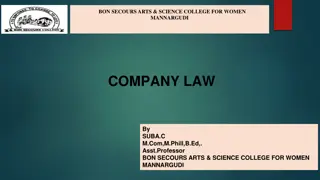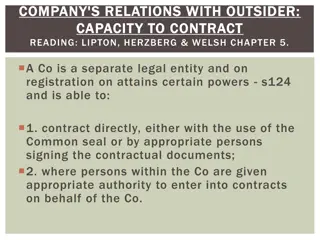Understanding the Meaning and Nature of Company Law in LL.B 3rd Semester
The concept of a company originates from the Latin words "com" and "panis," denoting a group of people dining together. In legal terms, a company is an artificial person created by law for a common purpose, with its own distinct legal existence. Key features include being a voluntary association, having a separate entity, and being able to enter into contracts. Companies must be incorporated under company law and can be public, private, or One Person Company.
Download Presentation

Please find below an Image/Link to download the presentation.
The content on the website is provided AS IS for your information and personal use only. It may not be sold, licensed, or shared on other websites without obtaining consent from the author. Download presentation by click this link. If you encounter any issues during the download, it is possible that the publisher has removed the file from their server.
E N D
Presentation Transcript
MEANING AND NATURE OF COMPANY LL LL.B. .B. 3 3rd rdSemester Company Law Semester Company Law Compiled by Compiled by- - Dr. Rahul Pandey Dr. Rahul Pandey Asst. Professor Asst. Professor Shia P.G. College Shia P.G. College Lucknow Lucknow
Meaning and Definition of Company The word company is derived from combination of two Latin words, namely, com and panis. The word com means with or together and panis means bread . Thus initially the word company referred to an association of persons who took their meals together. The merchants in the leisurely past, took advantage of these festive gatherings to discuss their business matters. (Alfred Palmer). The word company has no strictly technical or legal meaning (Stanley). Definition of Company Lindley, L.J. By a company is meant an association of many persons who contribute money or money s worth to a common stock and employ it for a common purpose. Prof. L.H. Haney Company is an artificial person created by law having a separate entity with perpetual succession and a common seal. Justice Marshall A Joint Stock Company is an artificial being, invisible, intangible and existing only in contemplation of law.
Justice James A company is an association of persons united for common purpose. A company has been defined in Section 2 (20) of the Companies Act, 2013 as a company incorporated under this Act or under any previous company law . The term company means a company incorporated under the Companies Act, 2013 or under any previous company law. The phrase, previous company law, refers to earlier company legislation in India, namely, the Joint Stock Company Act, 1857; the Indian Companies Act, 1866; the Indian Companies Act, 1882; the Indian Companies Act, 1913 and the Companies Act 1956.
Thus, the important features of a definition of company are as follows:- i. A company is an artificial person, as it has no body or soul and exists only in the eyes of the law. Law alone can dissolve it. It may purchase and sell property, and, enter into contracts through natural persons. It can sue and can be sued by others. ii. A company is a voluntary association of persons formed for some common purpose. iii. A company is a creation of the law i.e. a company is a legal person . iv. A company really exists and it is not a fictitious entity. A company comes into existence on its incorporation i.e. on the issue of certificate of incorporation by the Registrar. v. On incorporation, a company becomes a body corporate or a corporation, and acquires a personality distinct from its members.
Characteristics of Company Incorporated association A company must be incorporated or registered under the Companies Act. Minimum number of members required for this purpose is seven in the case of a public company and two in the case of a private company . However, Section 3 of the Companies Act, 2013 allows formation of One Person Company also. Artificial Person A company is an artificial legal person. It is created by law and law and law can alone dissolve it. It is invisible and intangible and exists only in the eyes of law. It may purchase and sell property. It may enter into contracts through natural persons It can sue and can be sued by others. It may be fined for contravention of the provisions of the Companies Act. However, it does not posses the physical attributes of a natural person. Therefore, it cannot marry or divorce; and it cannot be sent to jail.
Perpetual Succession An incorporated company has perpetual succession, that is notwithstanding any change in its members, the company shall retain the same entity with the same privileges and immunities, estate and possessions. In other words, the death or insolvency of individual member does not in any way, affect its corporate existence and the company shall continue its existence as usual until it is wound up in accordance with the provisions of the Companies Act. The perpetual existence of an incorporated company is well illustrated by proverbial saying, members may come and members may go, but the company can go on for ever . According to R.N. Owens the modern corporation with its continuous existence, despite its changing membership has been compared with a river which retains its identity even though the parts which compose it are constantly changing.
According to Professor Gower during the war all the members of a private company were killed by a bomb while they were in a general meeting, but the company still survived and not even a hydrogen bomb could have destroyed it . Separate legal entity A company is in law regarded as an entity separate and distinct from its members. In other words, it has an independent legal existence. As a company is a separate entity, it can enter into contracts in its own name, it can own and hold assets, it can owe money to others, it can sue and be sued to enforce any legal right. Any of its members can enter into contracts with it in the same manner as any other individual can and he cannot be held liable for the acts of the company even if he holds virtually the entire share capital. The company s money and property belong to the company belong to the company and not to the shareholders (although the shareholder own the company ). Being a separate legal entity, the nationality of the company does not depend on the nationality of its members. Moreover, the member cannot also be held liable for its debts.
Limited Liability In case of a company with limited liability, the liability of the members of the company is limited to the extend of the amount unpaid on the shares held by them. It may be noted that there may be a company limited by guarantee and a company with unlimited liability, but the companies with limited liability are most popular. In case of a company limited by guarantee, the liability of the members is limited to a specified amount mentioned in the memorandum. Representive Management Shareholders have no direct concern with the managements of the company. They exercise only a formative control. Thus the management of the company is altogether different from its ownership. Independent functioning of managerial personnel attracts talented professional persons to work for the company in an atmosphere of independence thus enabling them to achieve highest targets of production and management leading to company s overall prosperity. The management of the company generally vests in the directors who decide the policy matters in the meetings of the Board of Directors.
Transferability of Shares In case of public limited company the shares are freely transferable without seeking any permission from the company or the other members. In case of a private limited company there are some restrictions on the transferability of the shares. Common seal A company being an artificial person is not bestowed with a body of a natural being. Therefore, it does not have a mind or limbs of human being. It has to work through the agency of human beings, namely, the directors and other officers and employees of the company. As per section 22, as amended by the Companies (Amendment) Act, 2015, a company may, by writing [ under its common seal, if any, ] authorise any person, either generally or in respect of any specified matters, as its attorney to execute other deeds on its behalf in any place either in or outside India:
[Provided that in case a company does not have a common seal, the authorisation under this subsection shall be made by two directors or by a director or a Company Secretory, wherever the company has appointed a Company Secretory.] A deed signed by such an attorney on behalf of the company and under his seal shall bind the company. Separate Property A company is a distinct legal entity. The company s property is its own. A member cannot claim to be owner of the company s property during the existence of the company. Capacity to sue and to be sued A company can sue or be sued in its own name as distinct from its members.
Limitation of Action A company cannot go beyond the power stated in its Memorandum of Association. The Memorandum of Association of the company regulates the powers and fixes the objects of the company and provides the edifice upon which the entire structure of the company rests. Company is not a citizen A company is not a citizen and therefore cannot enjoy the fundamental rights like right to vote which are available to citizens only under article 19 of Indian Constitution. Termination of Existence Company is an Artificial person created by law. Therefore, it can be dissolved only by which creates.
SOURCE/CREDIT COMPANY LAW, AVTAR SINGH, EBC, LUCKNOW, UTTAR PRADESH COMPANY LAW AND SECRETARIAL PRACTICE, DR. G.K. VARSHNEY, SAHITYA BHAWAN PUBLICATIONS, AGRA COMPANIES ACT, 2013, RAVI PULIANI, BHARAT LAW HOUSE PVT. LTD. COMPANY LAW, Dr. G.K. KAPOOR. TAXMANN PUBLICATION PVT. LTD, NEW DELHI COMPANY LAW, Dr. N.V. PARANJAPE, CENTRAL LAW AGENCY, ALLAHABAD ELEMENTS OF COMPANY LAW, N.D. KAPOOR. SULTAN CHAND AND SONS (P) LTD, NEW DELHI COMPANY LAW, B.K. GOYAL. SINGHAL LAW PUBLICATIONS, DELHI COMPANY LAW, DR. ASHOK K. JAIN. ASCENT PUBLICATIONS, DELHI] THE COMPANY ACT, 2013 (BARE ACT) THANK YOU























